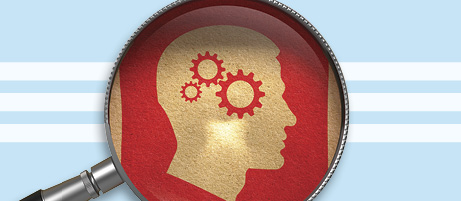Can Employers Move the Needle on America’s Mental Health?
Seven Ways Your Leaders Can Get Started

Since we spend a significant chunk of our waking hours at work, employers are in a prime position to make a difference in America’s collective mental health. Because of the large role they play in employees’ lives, employers can be a first line of defense in keeping mental health issues from taking root, and can also play a pivotal role in helping individuals who suffer from depression and anxiety cope and recover.
1. Make sure people can access resources anonymously.
Because studies show that 86% of employees are unwilling to discuss their condition with workmates, provide workplace resources—including a mental health policy, wellness program, and intranet materials—that can be accessed anonymously. Whether available via an organization’s intranet or downloadable in the form of a smart-phone app, these resources must be both practical and evidence-based. To accommodate different learning styles, multi-media delivery would be optimal.
2. Make it easy to seek help in person, too.
Leaders can promote the availability of Employee Assistance Programs and provide regular stories of how these services have helped others. They should also consider how peer support programs could be created so that every team member has a trusted colleague who can provide support and practical advice on mental well-being strategies. (Think of these mentors as “mental health first aid officers.”)
3. Provide a list of competent mental health professionals.
A big regret for depressed individuals is that they didn’t get an accurate diagnosis and treatment plan earlier. One reason people delay getting treated is because it can be very difficult for a depressed person to make a decision regarding what kind of professional they need to see. If companies assemble a panel or list of suitable mental health professionals that employees can feel comfortable going to when they need assistance, that’s a big help.
4. Provide ways for employees to get exercise.
According to the Mayo Clinic, a 30-minute brisk walk improves your mood, so consider incorporating exercise into the workday. Have walking meetings rather than sitting meetings. Encourage people to get outside and, if possible, walk in nature at lunchtime or during breaks. Form an office softball league!
5. Offer tools to help employees develop mental resilience.
Employees with a positive mood are 31% more productive, sell 37% more, and are 300% more creative. Clearly, it’s good for your company’s health, as well as your employees’ health, to help them develop mental resilience. You can help them by teaching time management and stress management techniques. Perhaps you could even offer periodic classes on meditation, yoga, or tai chi to encourage the pursuit of inner peace! And whenever possible, be generous with flex-time and time off to help your people switch off, relax, and regenerate.
6. Discover and use employee strengths.
Employees achieve the greatest fulfillment from work when they’re using their strengths. And of course, ensuring your employees are doing work that is truly engaging and that they actually like to do is great for companies, too. Not only will employees be more productive, but their work will also be of a greater quality.
7. Do not punish or penalize employees who are struggling.
Employers need to be very careful how they address employees who are struggling with a mental health disorder. The most important thing leaders can do is to constantly display a caring, compassionate attitude. The employer should have an open and honest discussion with the person to determine if he or she can fulfill all the duties in the job description. Remember, this discussion is not an opportunity to make the person feel bad about performance. It is an opportunity to work out a plan that helps everyone move forward in the best possible way.







